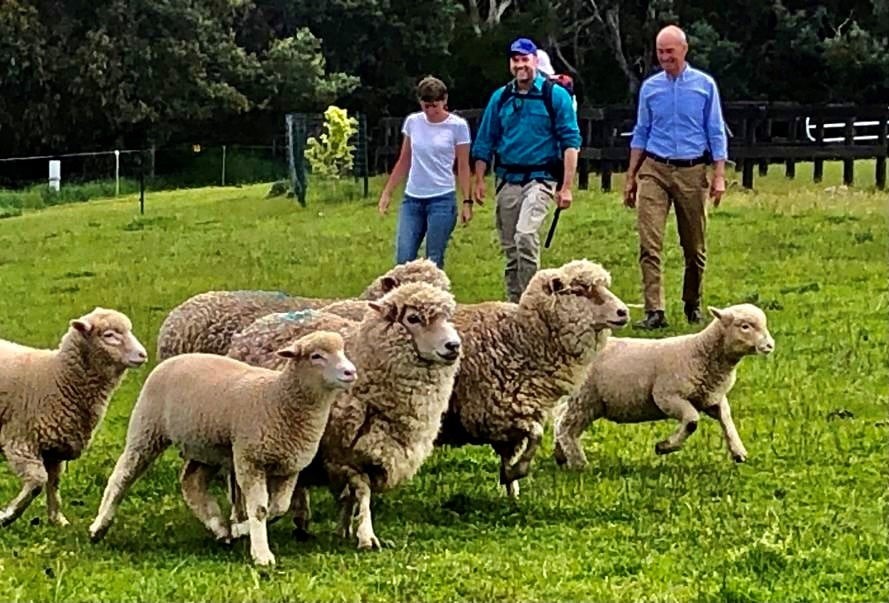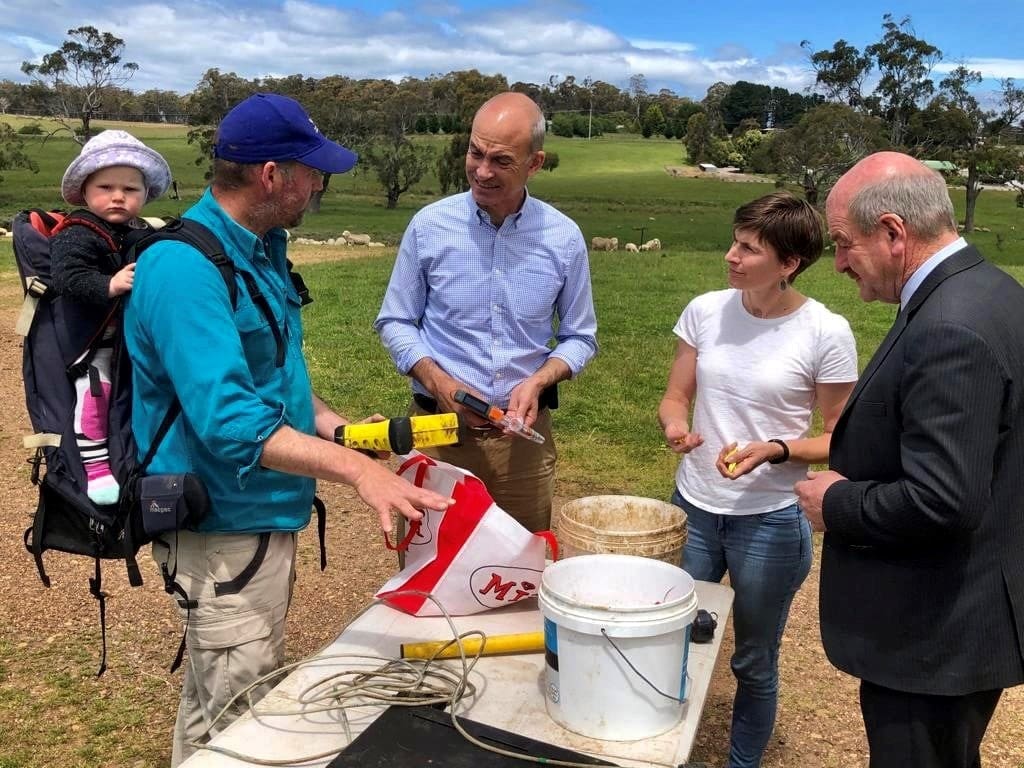
Tasmanian Red Meat Industry Steering Committee chair Felicity Richards, left, with Hadspen sheep producer Marcus James and Minister for Primary Industries and Water Guy Barnett.
TASMANIA has taken the first step in investigating the introduction of electronic identification across its sheep industry with a $250,000 State Government commitment.
Minister for Primary Industries and Water Guy Barnett yesterday announced the Tasmanian Government is supporting the red meat industry with an investment of up to $250,000 to explore the introduction of EID in sheep.
Mr Barnett said in addition to the biosecurity benefits, EIDs promote provenance and market surety which are important to the Tasmanian brand and the state’s trade performance now and into the future.
The project is part of a $1 million Tasmanian Government commitment to support the development of the red meat industry and has been developed by the Tasmanian Red Meat Industry Steering Committee (TRMISC) chaired by Felicity Richards.
Ms Richards said the first stage of the project will involve employing a consultant to examine what has been learned about EID from sheep producers in Tasmania and other states who voluntarily use EIDs, and in Victoria, which has mandated sheep and goat EID ear tag use. This would explore the benefits and hurdles of EID use on farms and through to the processor, she said.
“At the second stage, we are going to be having a look at what it might look like if it is rolled out here.”
Ms Richards said this would involve a lot of consultation with producers, stock agents and processors, to explore their sentiments, any concerns about implementation and what support would be needed.
“We do want to reassure everyone that we do want to hear from you,” she said.
“The third stage will look at ‘if you were going to do it, what would your implementation plan look like?’”
Ms Richards said it was hoped that the level and basis of opposition to an EID system for sheep in Tasmania would also be looked at “if it (EID) was to become mandatory.”
“We think it is likely that at some point it is going to happen and that we would be mad not to look at it and be prepared in the event that it does happen, and understand how to roll it out as seamlessly as possible.”
Ms Richards said EID tags have long been required for cattle.
“In Tasmania, they are currently required for sheep if the animals are sold or transferred under a market program, or if the animals are moved to Victoria where sheep EIDs are mandatory,” Ms Richards said.
“These insights will inform the later stages of the project which will include detailed roadmaps for their use in Tasmania.”
Show the benefits or mandate?
Ms Richards said she would have a better idea in 12 months whether sheep EID in Tasmania would be adopted or mandated. She hoped that the state would be led by credible wool and lamb producers showing how beneficial EID use is and how it can be implemented.
“I would like to think you wouldn’t have to mandate it before everyone pulls their finger out.”
She said Tasmania is not being told by government that EID must be mandated for sheep.
“But there are a lot of conversations about biosecurity and trade, and I think there are certainly pressures that are coming that suggest this is something we certainly need to look at.
“I am really happy to say that we are not going to sit back and say we will not be one of the last to think about it –we will actually get out there and have a think about it right now.”
Ms Richards believed Tasmania’s biosecurity would be better served by a well-implemented EID-based system than by the current mob-based visual tag system. She agreed that any gaps in the sheep ID system represented a biosecurity risk to the cattle industry, but also recognised that the EID system for cattle had problems – the ‘ghost’ herd — and these would be considered to determine how to make a sheep system an effective biosecurity tool.
EID benefits are the key for Hadspen producer

Hadspen sheep producer Marcus James, with daughter Adelaide, shows EID equipment to Minister for Primary Industries and Water Guy Barnett, Tasmanian Red Meat Industry Steering Committee chair Felicity Richards and the Member for Lyons Mark Shelton.
Hadspen property owner Marcus James is using EID ear tags in his ewe flock for selection on fleece quality and production, to record pregnancy status and to do weight-specific worm drenching.
“We see the long-term benefit of EIDs as an on-farm tool to improve productivity through better monitoring and management of animal welfare and performance.
“EIDs not only enable us to collect more data, but via the capability to automate drafting they also allow us to efficiently use that information to deliver better production and on farm outcomes,” he said.
Mr James believes that mandatory uptake of sheep EID in Tasmania is inevitable because of the need for traceability across the supply chain and the on-farm productivity benefits.
He believes the Tasmanian EID project should focus on bringing producers “on board” by helping them understand the benefits in using the data generated by electronic tag use. He believes Tasmania should join the annual tag tender conducted by the Victorian Government. He supported transitional but not long term tag subsidies, and help for farmers to invest in the scanning and data collection equipment to get productivity benefits.
Mr James said it was a good time for producers to start using EID tags and amortise the costs while lamb and sheep prices were high, but there was “zero” immediate benefit to farmers in tag uptake without using the data generated to lift productivity.
“Then it becomes easier for the farmer to invest in it year-on-year.”
Mr Barnett said red meat is a key component of Tasmanian agriculture and a strong meat industry is essential to achieving our target to sustainably grow the farm gate value of Tasmanian agriculture to $10 billion by 2050.



HAVE YOUR SAY